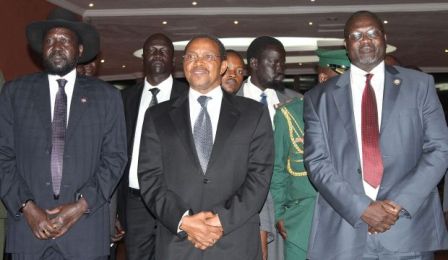S. Sudan’s Machar in Tanzania for intra-SPLM party dialogue
January 18, 2015 (ADDIS ABABA) – South Sudan’s former vice-president, Riek Machar, who leads the opposition faction of the Sudan People’s Liberation Movement (SPLM-IO), is in Tanzania to attend the ongoing intraparty dialogue with president Salva Kiir’s faction.

Delegates from the two warring parties have been engaging in a series of negotiations in Arusha to try to bridge the rift created by divisions among party leaders which resulted in the violence that erupted on 15 December 2013.
Machar, who returned to Addis Ababa on Friday from Pretoria in South Africa, arrived in Arusha on Sunday.
“Yes, he arrived in Arusha on Sunday to grace the intra-SPLM dialogue,” the opposition leader’s spokesman, James Gatdet Dak, confirmed his travel to Sudan Tribune on Sunday.
Dak said the rebel leader’s trip came in response to invitation by the Tanzanian president Jakaya Kikwete, also the chairman of the Tanzanian ruling party, The Chama Cha Mapinduzi (CCM).
CCM has been sponsoring and moderating the intraparty talks since mid-last year in which the parties previously agreed on the agenda and guiding principles.
Sources close to the talks suggested there was prospect of a breakthrough in the latest round of negotiations.
The SPLM-IO faction had suggested the need to address the root causes including deficiencies in the party’s top leadership, hinting replacement as a positive step.
The talks are however not a substitute for the ongoing peace process under the auspices of the Intergovernmental Authority on Development (IGAD), but rather a supplement.
While the intraparty dialogue attempts to address the root causes of the 15 December violence which generated from within the ruling party and has plunged the country into the civil war, the IGAD process encompasses all national issues beyond the SPLM party.
Violence erupted when what seemed to be a healthy debate within the leadership of the ruling party turned violent.
The conflict pitted president Kiir’s loyalists against Machar’s supporters. Kiir accused his former deputy of allegedly attempting a military coup, a claim he denied, saying it was a ploy by the president to silence his colleagues who called for reforms.
Tens of thousands of people died over the past year, with nearly two million displaced internally and to neighbouring countries, while four million others are threatened by hunger.
TALKS COLLAPSE
Meanwhile, talks aimed at uniting the three different factions of South Sudan’s ruling party (SPLM) have collapsed, raising uncertainties and casting doubts over whether the groups would ever come under the same political entity and one leadership.
Held in Arusha, Tanzania, the factions were last week expected to hold a self-examining and critically evaluate how the factions led by different senior members and officials could come together under one leadership, but failed to reach a consensus over several issues, including overhauling the entire structure and reinstating the ruling party’s former secretary general, Pagan Amum.
Akol Paul Kordit, the head of the youth wing of the group allied to the president Kiir and a member of the discussion told officials on Saturday that talks have failed to progress because the armed opposition group led by Machar and the group of former detainees to which Amum belongs made impossible demands a the negotiations.
“We could not make significant progress in this round because those whom we wanted to negotiate in good faith and opened hearts and minds decided to go the venue of dialogue with impossible demands and conditions”, said Kordit.
He mainly blame representative of the other two rival factions for refusing and holding to issues which became the cause of contention and inability allow progress in talks.
“The group of former detainees made pre-conditions and demands Pagan Amum must be reinstated to his position as the secretary general in order for them to participate in dialogue. On the other hand, the SPLM in Opposition are demanding dissolution of the mother SPLM, so that reunification process can begin. On our side, we said these are demands and conditions which cannot make us move forward,” said the youth leader.
“These are impossible demands and conditions because nobody has any right to demand total dissolution of the structure of the historical party and its leadership”, he added.
Kordit described as “unjustifiable” demands made by the country’s former detainees, saying Amum’s dismissal from the secretary general’s was not linked to current conflict.
“There is link to the current conflict because he was removed through a resolution of the leadership council on report submitted by the committee formed to investigate his misconducts and for mismanaging the party and insubordination of the leadership”, he stressed.
According on the youth leader, Amum was axed from the top level party leadership position following a decision of the national liberation council at its 2013 meeting.
(ST)
